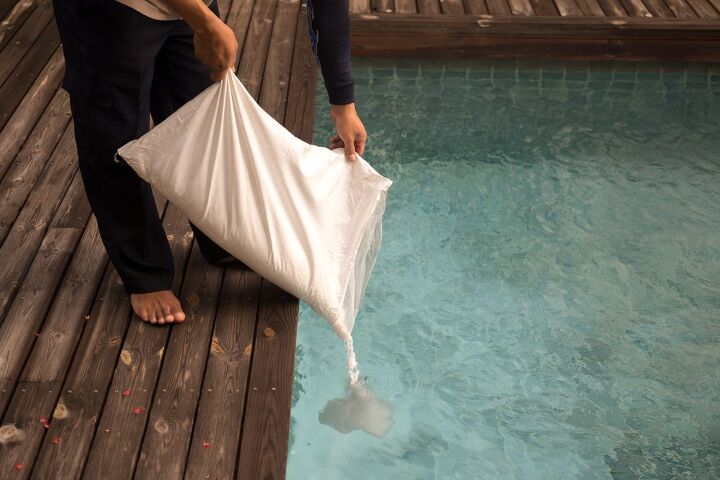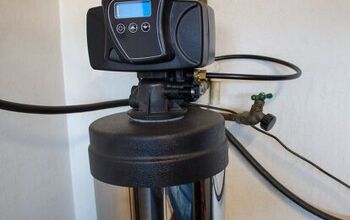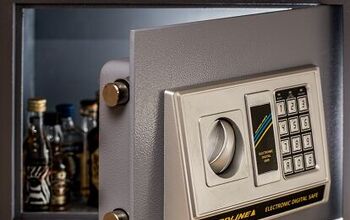Pool Salt Vs. Water Softener Salt: Which One Is Better?

When you first start reading up on all the bits and bobs surrounding pool maintenance, it becomes clear that salt is a thing. Like, big time. There are tons of different types of salt that are used in keeping our water’s conditions good to go. For example, most people don’t even realize that pool salt is different from the salt used to soften water. Check out the differences between the two…
Pool salt and water softener salt can both be used to maintain your pools. However, water softener salt is coarser and may include impurities that may have a corrosive and discoloring effect on more delicate pools. It may take longer for water softener salt to dissolve too.
If you need to make sure that your saltwater pool is going to work well, you need to get the scoop on your salts. My guide will give you the basics.
Do You a Need Pool, Spa, or Hot Tub Contractor?
Get free, zero-commitment quotes from pro contractors near you.

Are Pool Salt And Water Softener Salt The Same Thing?
For the most part, the answer is yes, but only to a point. Both pool salt and water softener will help purify your pool by releasing low levels of chlorine over a set period of time. They are also safe to use in your swimming water. However, there are some very minor differences that you need to be aware of if you want to use water softener salts in your pool:
- Water softener salt often comes in pellets and is coarser. This means that dissolution time will be longer. Bigger crystals will take a longer time to dissolve.
- Pool salt is finer and made for fast dissolving. This makes your pool maintenance easier, not to mention shorter in time.
- Both pool salt and water softening salt are graded the same way. If you want to use water softening salt, you need to get high quality, highly pure salt. Look for water softening salt pellets that have above a 99 percent purity rating.
- What you get in your water softener salt will vary more than with pool salt. Some water softener salts will have higher levels of manganese. This may cause some discoloration in pools. It’s best to avoid water softener salts from the Midwest for this reason.
- Some water softeners may also carry impurities. You might notice that some water softener has a pink or greyish tint. This is due to manganese and iron in the salt. We do not suggest using this in your pool.
Can You Use Water Softener Salt In Your Pool?
Water softener is totally safe to use as a way to clean up your pool. Like pool salt, it will give you adequate levels of chlorine to keep your pool clean. While many people may advise you not to use water softener salt, the truth is that you won’t experience any negative effects from it as long as it is over 99 percent pure NaCl or KCl.
Pool salt may be easier to work with, but it’s not like using high-quality water softener salt will kill you. Pure water softener salt won’t even harm your skin. In that sense, it’s all good. However, using the wrong water softener salt can damage your pool and stain your water.
Can You Use Water Softener Salt That’s Impure In Your Pool?
While you can use some water softener pellets, you can’t use all of them. Impurities in your water softener can cause corrosion on vinyl pool floors and can also make your pool water turn colors. In some rare cases, certain impurities can cause skin irritation in people who have sensitive skin.
Do You Need To Add Extra Water Softener Salt To Your Pool?
If you are using water softener salt to your pool instead of pool salt, you might be curious about changing the amount of salt. The truth is, you shouldn’t change things up. You will need the exact same amount of salt either way.
What Happens If You Use Pool-Graded Water Softener Salt In Your Pool?
Water softener salt will clean your pool and keep it healthy to swim in, provided that you use it properly. However, there are some slight differences that you might notice.
- Longer Dissolution Times. You may have to wait longer for your pool to be properly chlorinated. How long you need to wait will depend on the size of the pellets. Most will notice at least a one to three-hour delay before the salt is fully dissolved into the pool.
- Some Sweeping Necessary. To avoid discoloration on vinyl pools, you will need to use a broom to sweep the salt around. It’ll also help your pool’s dissolution time.
- Lower Price Tag. Here’s the good part about using water softener salt in your pool: you’ll notice lower pool maintenance bills. Water softener salt is noticeably cheaper than pool salt.
Pool Salt vs. Water Softener Salt: Pricing
Now that we’ve gone through the basics, let’s talk about salt prices. Pool salt will cost between $5 to $8 per 40-lb bag, making it pretty reasonable. If you want to get a slightly cheaper option, you can use water softener salt for $4 to $6 per bag. While the price range is similar, the small savings can add up over time.
The only thing that you really want to consider is that water softener salt can work well for a wider range of purposes. More specifically, it can work as a water softener and as a more effective de-icer during the wintertime. This makes it more versatile and also tends to mean you’ll save money and space on salt storage.
Which Should You Use, Pool Salt Or Water Softener Salt?
Honestly, it won’t make that much of a difference in the long run. If you want to save a little bit of money, then it makes sense to look for high-end water softener pellets. However, many people who are particularly fastidious about their pool health will choose pool salt. It’s the easiest way to make sure you get the quality you want at a fairly reasonable price. Besides, it’s usually convenient enough to find at the pool store.
Do You a Need Pool, Spa, or Hot Tub Contractor?
Get free, zero-commitment quotes from pro contractors near you.

Related Questions
Can I use table salt in my water softener?
While it may be tempting to try to cut costs by adding table salt in your water softener, the truth is that you can’t use just any salt. You need to use coarse water softener pellets. Salt that’s too fine will end up harming your water softener and can potentially seep into your drinking water. Thankfully, water softener pellets are pretty cheap. You just have to find a place to store the bag, really.
Is it possible for water softener pellets to scratch or break a vinyl pool’s bottom?
If you are worried about using water softener pellets in a vinyl or “fabric” pool, you probably should skip using it. For the most part, vinyl pools are far more durable than people give them credit for. A simple scratchy surface (like the ones on pellets) usually will not damage pool. However, if it’s digging into the pool’s bottom and being dragged heavily, it could potentially cause some slight damage.Even with mild scratches, it’s extremely unlikely that you will have a pool break or pop as a result of using water softener pellets. If this happens, you probably were going to need to get a new pool anyway.
Do all pools need to have salt added to them?
Salt is added to pools as a way to gently chlorinate the pool. That’s why they are called saltwater pools. If you have a different way to chlorinate and clean your pool, then you don’t need any salt in your pool. In fact, traditional pools don’t really involve any type of salt in their maintenance whatsoever. So, if you don’t have a saltwater pool, there’s no need to buy up a bag of salt.

Ossiana Tepfenhart is an expert writer, focusing on interior design and general home tips. Writing is her life, and it's what she does best. Her interests include art and real estate investments.
More by Ossiana Tepfenhart











![10 Best Electric Pressure Washers – [2022 Reviews & Guide]](https://cdn-fastly.upgradedhome.com/media/2023/07/31/9070600/10-best-electric-pressure-washers-2022-reviews-guide.jpg?size=350x220)


![The 10 Best Table Saws - [2022 Reviews & Buyer's Guide]](https://cdn-fastly.upgradedhome.com/media/2023/07/31/9070645/the-10-best-table-saws-2022-reviews-buyer-s-guide.jpg?size=350x220)












